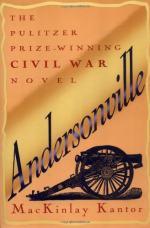CHAPTER XLIII.
Difficulty of exercising—EMBARRASSMENTS of A morning walk—the Rialto of the prison—cursing the southern confederacy—the story of the battle of Spottsylvania Courthouse.
Certainly, in no other great community, that ever existed upon the face of the globe was there so little daily ebb and flow as in this. Dull as an ordinary Town or City may be; however monotonous, eventless, even stupid the lives of its citizens, there is yet, nevertheless, a flow every day of its life-blood—its population towards its heart, and an ebb of the same, every evening towards its extremities. These recurring tides mingle all classes together and promote the general healthfulness, as the constant motion hither and yon of the ocean’s waters purify and sweeten them.
The lack of these helped vastly to make the living mass inside the Stockade a human Dead Sea—or rather a Dying Sea—a putrefying, stinking lake, resolving itself into phosphorescent corruption, like those rotting southern seas, whose seething filth burns in hideous reds, and ghastly greens and yellows.
Being little call for motion of any kind, and no room to exercise whatever wish there might be in that direction, very many succumbed unresistingly to the apathy which was so strongly favored by despondency and the weakness induced by continual hunger, and lying supinely on the hot sand, day in and day out, speedily brought themselves into such a condition as invited the attacks of disease.
It required both determination and effort to take a little walking exercise. The ground was so densely crowded with holes and other devices for shelter that it took one at least ten minutes to pick his way through the narrow and tortuous labyrinth which served as paths for communication between different parts of the Camp. Still further, there was nothing to see anywhere or to form sufficient inducement for any one to make so laborious a journey. One simply encountered at every new step the same unwelcome sights that he had just left; there was a monotony in the misery as in everything else, and consequently the temptation to sit or lie still in one’s own quarters became very great.
I used to make it a point to go to some of the remoter parts of the Stockade once every day, simply for exercise. One can gain some idea of the crowd, and the difficulty of making one’s way through it, when I say that no point in the prison could be more than fifteen hundred feet from where I staid, and, had the way been clear, I could have walked thither and back in at most a half an hour, yet it usually took me from two to three hours to make one of these journeys.
This daily trip, a few visits to the Creek to wash all over, a few games of chess, attendance upon roll call, drawing rations, cooking and eating the same, “lousing” my fragments of clothes, and doing some little duties for my sick and helpless comrades, constituted the daily routine for myself, as for most of the active youths in the prison.




